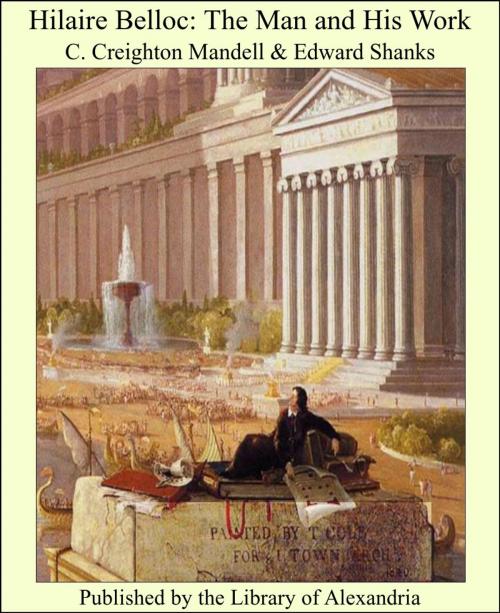Hilaire Belloc: The Man and His Work
Nonfiction, Religion & Spirituality, New Age, History, Fiction & Literature| Author: | C. Creighton Mandell | ISBN: | 9781465529541 |
| Publisher: | Library of Alexandria | Publication: | March 8, 2015 |
| Imprint: | Language: | English |
| Author: | C. Creighton Mandell |
| ISBN: | 9781465529541 |
| Publisher: | Library of Alexandria |
| Publication: | March 8, 2015 |
| Imprint: | |
| Language: | English |
When I first met Belloc he remarked to the friend who introduced us that he was in low spirits. His low spirits were and are much more uproarious and enlivening than anybody else's high spirits. He talked into the night; and left behind in it a glowing track of good things. When I have said that I mean things that are good, and certainly not merely bons mots, I have said all that can be said in the most serious aspect about the man who has made the greatest fight for good things of all the men of my time. We met between a little Soho paper shop and a little Soho restaurant; his arms and pockets were stuffed with French Nationalist and French Atheist newspapers. He wore a straw hat shading his eyes, which are like a sailor's, and emphasizing his Napoleonic chin. He was talking about King John, who, he positively assured me, was not (as was often asserted) the best king that ever reigned in England. Still, there were allowances to be made for him; I mean King John, not Belloc. "He had been Regent," said Belloc with forbearance, "and in all the Middle Ages there is no example of a successful Regent." I, for one, had not come provided with any successful Regents with whom to counter this generalization; and when I came to think of it, it was quite true. I have noticed the same thing about many Other sweeping remarks coming from the same source. The little restaurant to which we went had already become a haunt for three or four of us who held strong but unfashionable views about the South African War, which was then in its earliest prestige. Most of us were writing on the Speaker, edited by Mr. J. L. Hammond with an independence of idealism to which I shall always think that we owe much of the cleaner political criticism of to-day; and Belloc himself was writing in it studies of what proved to be the most baffling irony.
When I first met Belloc he remarked to the friend who introduced us that he was in low spirits. His low spirits were and are much more uproarious and enlivening than anybody else's high spirits. He talked into the night; and left behind in it a glowing track of good things. When I have said that I mean things that are good, and certainly not merely bons mots, I have said all that can be said in the most serious aspect about the man who has made the greatest fight for good things of all the men of my time. We met between a little Soho paper shop and a little Soho restaurant; his arms and pockets were stuffed with French Nationalist and French Atheist newspapers. He wore a straw hat shading his eyes, which are like a sailor's, and emphasizing his Napoleonic chin. He was talking about King John, who, he positively assured me, was not (as was often asserted) the best king that ever reigned in England. Still, there were allowances to be made for him; I mean King John, not Belloc. "He had been Regent," said Belloc with forbearance, "and in all the Middle Ages there is no example of a successful Regent." I, for one, had not come provided with any successful Regents with whom to counter this generalization; and when I came to think of it, it was quite true. I have noticed the same thing about many Other sweeping remarks coming from the same source. The little restaurant to which we went had already become a haunt for three or four of us who held strong but unfashionable views about the South African War, which was then in its earliest prestige. Most of us were writing on the Speaker, edited by Mr. J. L. Hammond with an independence of idealism to which I shall always think that we owe much of the cleaner political criticism of to-day; and Belloc himself was writing in it studies of what proved to be the most baffling irony.















